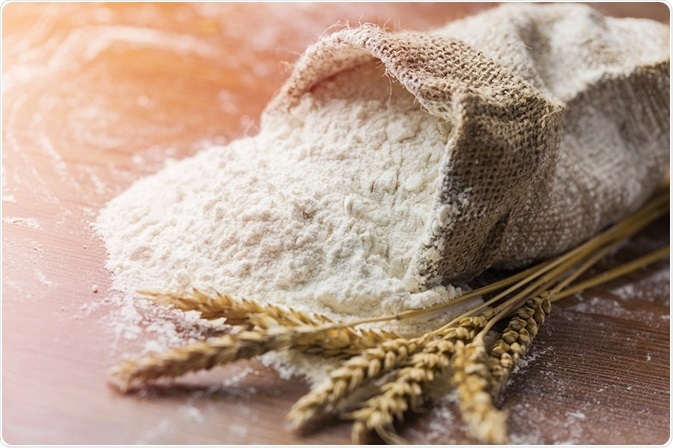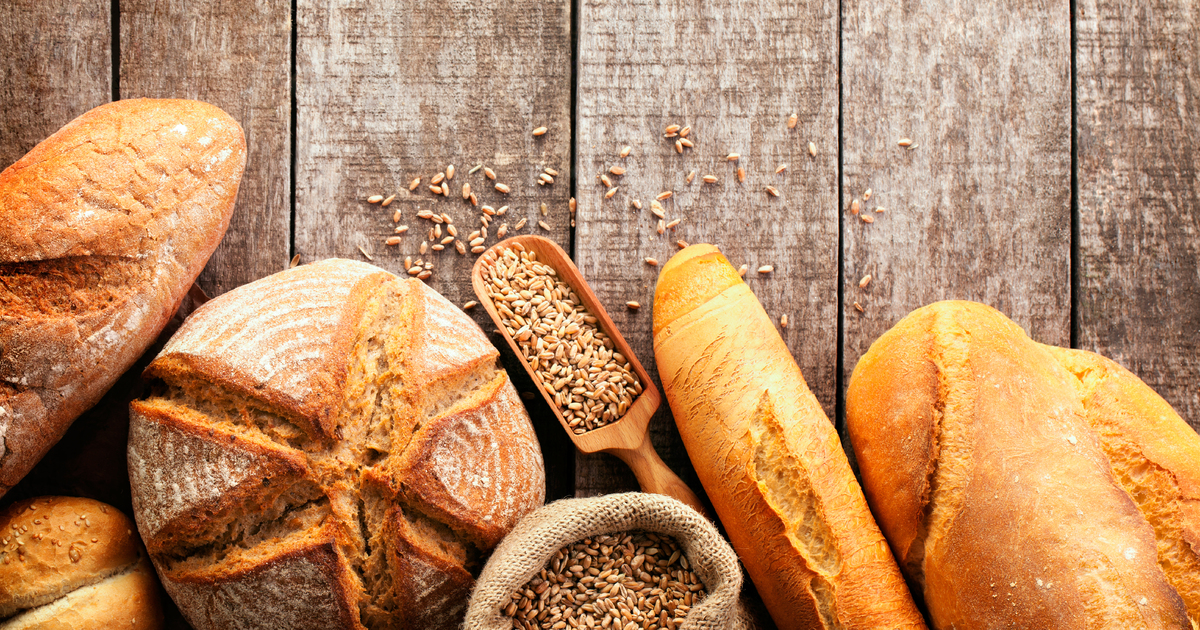From spelt in the Bronze Age to baked goods in modern grocery stores, wheat - and its protein component, gluten - has been an important part of our meals throughout the ages. Yet the gluten-free diet - a diet that excludes the gluten found in grains such as wheat, barley, rye - has become increasingly popular due to fears of gluten sensitivity and digestive problems. However, it is overlooked that gluten is a natural component of most whole grains, and we’ve been consuming it since we first started cultivating these grains over 8000 years ago.

Gluten is a Latin word that means “glue,” due to its ability to hold grains like wheat, barley, and rye together. It’s the protein that gives pasta, bread, and other wheat products their chewy, flexible texture. It’s also critical in making dough rise in the oven, resulting in leavened bread.
So what is causing the rise in gluten intolerance and the need for a gluten-free diet?
- In the last 50 years, the wheat grain has been altered to provide crops that are more resistant to drought, to resist fungal diseases and pest attacks, to improve ease of mechanical harvesting and meet the increased demands of baking goods. We are eating more wheat products now than ever before.
- The use of harmful chemical additives and dough “improvers” necessary to produce consistent products in industrialised food production. The cheapest ingredients are also used and time spent in actual production itself is cut to maximise profits. Therefore the wheat grain is not able to develop fully and ferment naturally which may aid in the reduction of the harmful gluten.
- Damaged gut flora or dysbiosis is also on the rise due to the high usage of antibiotics or consuming food that they can’t digest. The immune system may see the undigested gluten as a microbial invader and attack them.
- Genetics may also play a part, somewhat smaller than others. Diseases are a combination of genetics and environmental factors. So, people react differently in their reactions to these changes.
- Other factors are also mentioned such as a disturbed microflora in our gut, use of microwaves and plasticware, being born via caesarean section and contracting intestinal infections.
Researchers have recently learned that the primary culprit in coeliac disease and gluten-intolerance is a particular peptide strand in the gluten molecule, not the gluten itself. This peptide strand was theoretically not present in ancient grains. Thus, coeliac disease is a disease of chronic inflammation of the small intestine due to this peptide strand, known as gliadin (found in modern wheat, rye and barley). Antibodies in the sufferer’s small intestine react to these ingested peptides by attacking them. This, in turn, irritates the gut and damages the finger-like structures along the intestinal wall known as microvilli. Without those microvilli, the absorption of nutrients from food is considerable less. This leads sufferers to experience symptoms of malabsorption, including chronic fatigue, neurological disorders, nutrient deficiencies, anaemia, nausea, skin rashes, depression, and more.
Gluten-Free Benefits
Going gluten-free means excluding wheat, rye and barley from your diet if you appear to have a gluten sensitivity or have been diagnosed with coeliac disease.
For some, cutting gluten out of the diet can come with big benefits when it comes to health. A gluten-free diet could increase fat burning, provide a burst of extra energy, reduce inflammation, and ease digestive symptoms like gas, bloating or diarrhoea. For others, going gluten-free could even be the key to reducing behavioural issues and improving symptoms of autism and irritable bowel syndrome.
May Ease Digestive Symptoms
· Going gluten-free could improve digestive issues such as bloating, gas and diarrhoea.
· A study in the American Journal of Gastroenterology looked at the effects of gluten on adults with non-coeliac gluten sensitivity. After eating gluten daily for six weeks, participants reported a worsening of symptoms like poor stool consistency, pain, bloating and fatigue.
Could Benefit Several Brain-Related Disorders
· Many cases of neurological illness may be caused and/or exacerbated by gluten consumption. This is called gluten-sensitive idiopathic neuropathy.
· The main neurological disorder believed to be at least partly caused by gluten is cerebellar ataxia, a serious disease of the brain that involves an inability to coordinate balance, movements, problems talking, etc. It is now known that many cases of ataxia are directly linked to gluten consumption. This is called gluten ataxia and involves irreversible damage to the cerebellum, a part of the brain that is important in motor control.
· Many studies show strong statistical associations between gluten consumption, gluten sensitivity and cerebellar ataxia. There is also a controlled trial showing that ataxia patients improve significantly on a gluten-free diet.
· There are several other brain disorders that respond well to a gluten-free diet:
- Schizophrenia: A subset of schizophrenia patients sees massive improvements by removing gluten.
- Epilepsy: There are several reports of patients with epilepsy improving significantly when removing gluten.
- Autism: Several studies suggest that people with autism see improvements in symptoms on a gluten-free diet.
· A study in Nutritional Neuroscience found that strict adherence to a gluten-free, casein-free diet led to improvements in autism behaviours, physiological symptoms and social behaviours, according to parents.
· Another study in Iran reported that a gluten-free diet decreased gastrointestinal symptoms and significantly decreased behavioural disorders in children with autism.
Anti-Inflammatory Properties
· There are studies showing that gluten can cause inflammation in the intestine and a degenerated intestinal lining.
· For those with coeliac disease, a gluten-free diet could help you avoid inflammation and prevent harmful health consequences that could occur as a result.
· One animal study noted that gluten intake shifted the balance of inflammatory immune cells in mice, causing an increase in markers of inflammation. Conversely, another animal study found that following a gluten-free diet improved levels of inflammatory markers in mice.
· However, more studies on humans are needed to determine whether a gluten-free diet can help reduce inflammation in humans, including those with and without coeliac disease.
Promotes Weight Loss
· A 2013 animal study reported that mice given a gluten-free diet showed reductions in body weight and fat, even without any changes in food intake. They also had increases in specific receptors and enzymes that enhance the breakdown of fat.
· Another animal study in the International Journal of Obesity found that eating wheat gluten increased weight gain by decreasing the energy expenditure of fat tissue.
· More studies are needed focusing on the effects of gluten on body weight and body fat on humans specifically.
Improves Symptoms of Irritable Bowel Syndrome
· Irritable bowel syndrome, or IBS, is an intestinal disorder that causes digestive symptoms like bloating, gas, constipation and diarrhoea.
· A study in the journal Gastroenterology compared the effects of a gluten-free and gluten-containing diet on participants with diarrhoea-predominant IBS. Interestingly, researchers found that those eating gluten had increased bowel frequency and intestinal permeability (or leaky gut) compared to those on a gluten-free diet.
Gluten Free for Health
Gluten Free Grains:
Some grains are naturally gluten free. See list below for gluten free substitutes:
|
· amaranth
· arrowroot
· buckwheat
· corn and cornmeal
· flax
· gluten-free flours (rice, soy, corn, potato, bean)
· hominy (corn)
|
· millet
· quinoa
· rice
· sorghum
· soy
· tapioca
· teff
|
Oats are naturally gluten free, but are often contaminated with wheat in the field or at the mill. So buying certified gluten-free oats is necessary for someone requiring a gluten free diet.
Foods Naturally Gluten Free:
|
· beans, seeds and nuts in their natural,
unprocessed form
· fresh eggs
· fresh meat, poultry and fish (not
marinated, breaded or batter-coated)
|
· fruits and vegetables
· most dairy products
|
What Not To Eat:
Avoid all food and drink that contains barley, rye, triticale (a cross between wheat and rye) and wheat.
Wheat flour goes by many names, so it is a challenge to avoid them as well, such as durum flour, einkorn, emmer, malt, farina, graham flour, kamut, semolina and spelt.
The following foods should be avoided unless they are labelled as gluten-free or made with gluten-free grain, such as corn, rice or soy:
|
· beer and malt beverages
· breads
· cakes and pies/ puddings
· sweets
· cereals
· Liquorice
· cookies and crackers
· croutons
· French fries
· gravies
· imitation meat or seafood
|
· matzo
· pastas
· processed luncheon meats
· salad dressings
· sauces, including soy sauce
· seasoned rice mixes
· seasoned snack foods, such as
potato and tortilla chips
· self-basting poultry
· soups and soup bases
· vegetables in sauce
|
Watch for cross-contamination. Cross-contamination can happen during production, so labels should be read carefully for "may contain" statements.
Be careful about eating out at restaurants. Ask the staff about gluten-free choices on the menu, and try to find out how it is prepared to avoid cross-contamination.
Medications and supplements: Prescription and over-the-counter medications may use wheat gluten as a binding agent. Talk to your doctor or pharmacists about the drugs you're taking. Dietary supplements that contain wheat gluten must have "wheat" stated on the label.

Precautions
People assume that all supermarket free-from products that are gluten-free is healthy but that’s not always the case. Some products that are gluten-free contain high amounts of sugar in order to make it more palatable. Food includes bread and bread products like waffles, pancakes, crackers, snack chips and pretzels made with white rice flour, tapioca flour and/or potato starch, cakes and cookies. Gluten-free foods, especially refined foods processed to make them gluten-free also cheat the consumer out of the many health benefits of whole grains and can be lacking critical nutrients such as fibre, iron, zinc, folate, niacin, thiamine, riboflavin, calcium, vitamin B12 and phosphorus.
People who only eat foods that are inherently gluten-free, like fruits, vegetables, gluten-free whole grains, lean protein, healthy fats, then gluten-free can be a healthy diet. However, if gluten-containing products are replaced with highly processed gluten free foods like pastries, energy bars, etc., weight loss will not be achieved and, in fact, weight may be gained as many gluten free foods are higher in calories than their gluten-containing replacements.
If you do follow a gluten-free diet, make sure that the rest of your diet is well-rounded and nutritious. Gluten-containing grains pack in plenty of essential nutrients, so it’s important to make sure you’re meeting your nutritional needs and filling any gaps with other nutrient-rich foods.
A gluten-free diet for kids is not advisable unless medically necessary or done under the supervision of a doctor or dietitian, as it can be lacking in important nutrients if not properly planned.
To Sum Up…
This blog only touches upon the world of gluten-free which is a vast subject. The rise in gluten intolerance and associated disease has been subject to much discussion. Modern food processing and modern living may have a part to play in causing a sensitivity to gluten.
Research into the benefits of a gluten-free diet is fast moving as well as the market for gluten-free products. Those with more serious conditions such as coeliac disease need to adhere to a strict gluten-free diet to prevent further damage to the small intestine and optimising digestive health. Moreover, being on a gluten-free diet has helped other conditions unrelated to the obvious gluten intolerance such as autism and epilepsy.
If you are sensible in how you approach your gluten-free diet you will be able to reap the optimum benefit from it. Eating more raw, fresh, organic and naturally gluten-free foods and grains is the way to go rather than relying on the food industry to provide you with processed gluten-free alternatives. Always consult a health professional before you embark on a strict gluten free diet.
Source
https://www.medicaldaily.com/brief-history-gluten-protein-baked-goods-how-wheat-intolerance-has-risen-over-years-353244
https://maninisglutenfree.wordpress.com/2011/07/05/the-history-of-how-wheat-became-toxic/
https://threebakers.com/5-reasons-gluten-intolerance-is-on-the-rise/
https://www.foodrenegade.com/the-rise-of-gluten-intolerance/
https://www.the-scientist.com/?articles.view/articleNo/49467/title/The-Celiac-Surge/
https://www.livescience.com/53061-gluten-free-diet-facts.html
https://draxe.com/gluten-free-diet/
https://www.mayoclinic.org/healthy-lifestyle/nutrition-and-healthy-eating/in-depth/gluten-free-diet/art-20048530
https://www.healthline.com/nutrition/6-shocking-reasons-why-gluten-is-bad#section2
